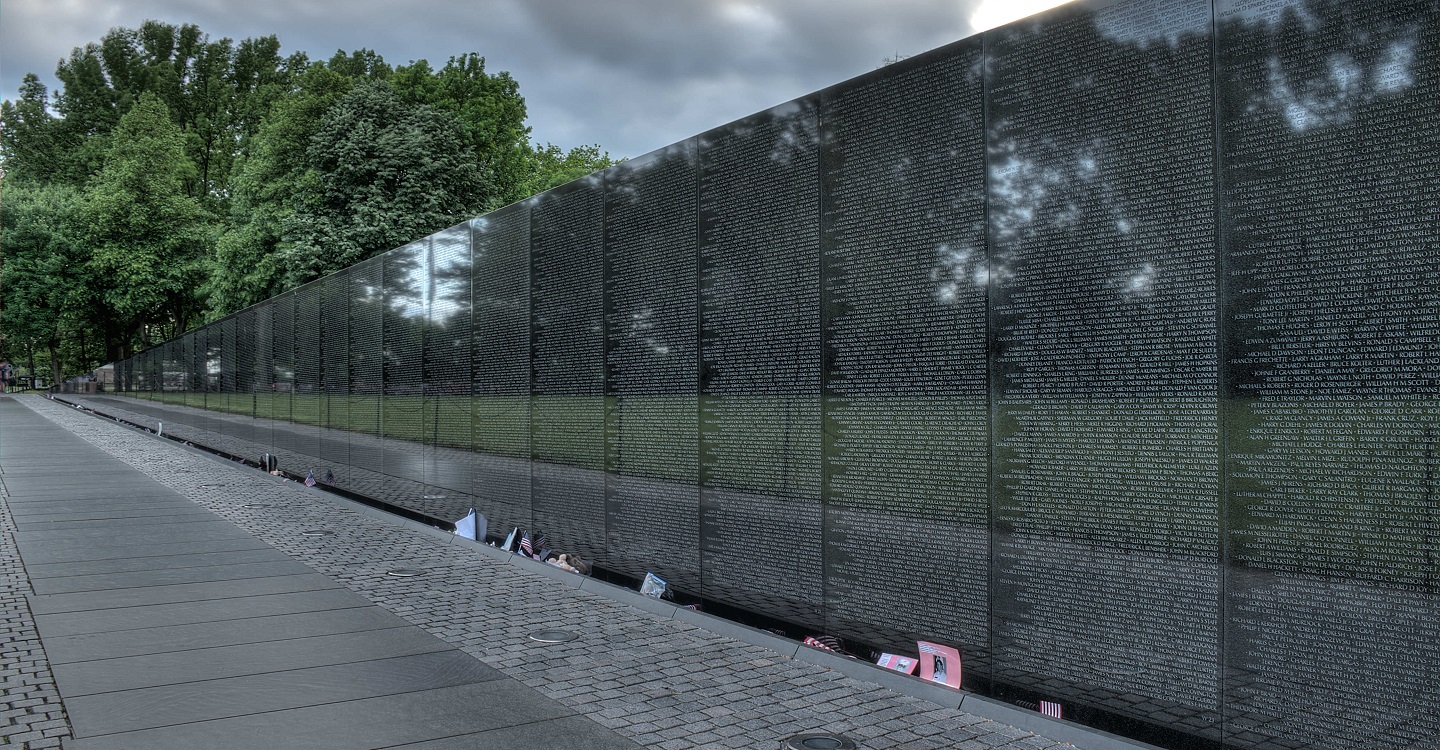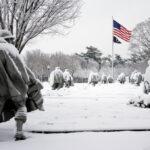
The very existence of the draft motivated enough men to enlist voluntarily that all branches of service were able to fill their quotas, often without conscripts.
For this whiteboard we reached out again to several scholars and asked the following:
What, to date, has been the most important legacy of the Vietnam Conflict?
1. Dr Amy Rutenberg (Dept of History, Iowa State University)
Dr Rutenberg is the author of Rough Draft: Cold War Military Manpower Policy and the Origins of the Vietnam-Era Draft Resistance, (Cornell University Press, 2019).
Memories of the Vietnam-era draft left such scars on the collective American psyche that when a handful of politicians and pundits advocated its reinstatement as a way to staff the War on Terror, their calls were almost universally met with derision. In such a context, it is hard to remember that between 1948 and 1965, when a different handful of politicians and pundits called for the end of the draft, their calls were equally met with derision. The end of the Cold War draft in the United States, therefore, is one of the Vietnam War’s most important domestic legacies. The death of conscription changed the calculus of American military engagement by dictating how conflicts would be fought and who would do that fighting.
Between 1948 and 1973, the draft was a fact of life for American men. With very few exceptions (i.e. Adlai Stevenson, Barry Goldwater), no one in a policy position advocated discontinuing conscription. The very existence of the draft motivated enough men to enlist voluntarily that all branches of service were able to fill their quotas, often without conscripts. That all changed with the escalation of the Vietnam conflict in 1965. Anti-war sentiment rose along with draft calls. Activists on both the political Left and libertarian Right protested conscription, leading President Nixon to explore the feasibility of an All-Volunteer Force (AVF). He wanted to sweep the legs out from under the antiwar Left and cement support from libertarians. After due study, draft calls were brought down to zero in 1972, and in 1973, the law authorizing conscription was allowed to expire.
The result is our current AVF, a much smaller organization that must compete for labor on the open market. Greater compensation, benefits, and diversity have followed, even as a significantly smaller percentage of the population has grappled with the prospect of military service. The shifting politics of the draft have, ironically, pulled those currently in favor of conscription in line with those who opposed it during the Vietnam era. Both constituencies hoped to move the military closer to the civilian populace by lessening inequities of service and by forcing civilian policymakers to take care when committing American troops to conflict. Regardless, it seems pretty clear that the AVF is here to stay.
2. Dr Meredith Lair (Dept of History and Art History, George Mason University)
Dr Lair is the author of Armed with Abundance: Consumerism and Soldiering in the Vietnam War (University of North Carolina Press, 2014).
What sounds like a historical question is also a math problem: calculation of the greatest change relative to the outcome. The Vietnam War wreaked so much havoc, and yet it changed so little. South Vietnam fell to communism, and the Domino Theory’s most concerning inevitabilities never came to pass. There are a lot of potential answers—so many, in fact, that I once taught an entire course called Legacies of the Vietnam War. Course units included (among others):
- The Vietnamese diaspora, which examined how the war’s immediate legacies in Southeast Asia caused millions to flee for their lives and create new communities.
- Agent Orange, about the environmental and health impacts of dioxin contamination but also the ensuing legal cases that limited the liability of American military contractors in perpetuity.
- Public, political, and doctrinal reluctance to support US military operations overseas, the better to prevent “another Vietnam.”
But, as important as these legacies are, they pale in comparison to the human toll, whose full measure will always elude us.
In the early days of my teaching career, I used an assignment called “Finding Vietnam,” which students could fulfill by interviewing someone—anyone—who was alive during the Vietnam War. The stories they uncovered were often astounding. A Vietnamese American student learned of an aunt he never knew. She was kidnapped and murdered as a toddler by the Viet Cong after her civil servant father—my student’s grandfather—refused to pay taxes to the National Liberation Front. A fatherless young man wrote about his dad, who served as a US Army dental hygienist in Vietnam. Cleaning teeth is about as far from combat as you can get, but the war killed him anyway: he contracted Hepatitis C while doing civic action for Vietnamese villagers and died of liver failure thirty years later. And then there was the young woman who found Vietnam in her own existence. When she got the assignment, she expressed frustration to her mother that she knew no one whose life had been altered by the Vietnam War. Which caused her mother to disclose that, prior to meeting my student’s father, she had been engaged to a young man who died. Serving in Vietnam.
The Vietnam War did not remake the world in a geopolitical sense, but it did implode the life of this woman, leaving her, decades later, still struggling to balance her grief over the path not taken against the joy of the family she made instead. That is an impossible math, yet millions of people around the world quietly perform it every day. The sum of those private, diffuse calculations is enormous, and the change wrought by the war compounds. To date, and forever.
3. Dr Heather Stur (Dept of History, University of Southern Mississippi)
Dr Stur is the author of Beyond Combat: Women and Gender in the Vietnam War Era (Cambridge University Press, 2011).
In 1978, Vietnam veterans gathered in Washington, DC, to discuss their shared concerns and figure out how to establish an advocacy group for Vietnam vets. Vietnam Veterans of America (VVA) was born of that meeting, and since then, Vietnam vets have led efforts to ensure that Americans forget neither their service nor the idea that they were treated poorly when they returned to the U.S. Vietnam vets have talked of being uncomfortably visible, drawing the attention of angry protesters who spat on them and called them baby killers. These anecdotes are controversial. Some Vietnam veterans, notably Jerry Lembcke, a sociology professor at College of the Holy Cross, have argued that the “spat upon veteran” is a myth that vets, along with filmmakers, writers, and government authorities, crafted to discredit the antiwar movement. Other vets have said that they felt invisible and longed for a loved one to ask them about their time in Vietnam. The notion that Americans at best ignored and at worst abused Vietnam vets when they arrived home has settled into the collective U.S. psyche and fueled the “support the troops” mentality that has defined relations between civilians and soldiers during America’s 21st century wars. This is the most important legacy of the Vietnam War.
The politics behind the war – the US vying for support among Vietnam’s neighbors, as well as engaging in covert and overt cooperation with regional groups – had a destabilizing effect in the region, especially in Cambodia and Laos.
Today, it isn’t surprising to see a civilian approach an American soldier in uniform and say “thank you for your service.” During the Vietnam War, U.S. troops were the enemy according to some antiwar activists, but in the wars in Iraq and Afghanistan, a largely bipartisan consensus has held soldiers as separate from, and even victims of, war making. Vietnam veteran activists and their civilian supporters crafted a memory of Vietnam vets as distinctly damaged in part because of how Americans treated them back home. As a result, “support the troops” has become the default civilian attitude toward soldiers and veterans since Vietnam. Yet Americans’ concern for service members has its limits. One way to support the troops is to reinstate the draft, which was about as unpopular as the Vietnam War. Conscription could ease the burden of service by spreading it across more personnel, sparing troops from multiple deployments. But the word “draft” often shares a sentence with the words “political suicide,” and so the abolition of the draft in 1973, and bipartisan opposition to it ever since, is a related and equally important legacy of the war.
4. Dr Jacqueline Whitt (Dept of National Security and Strategy, United States Army War College)
Dr Whitt is the author of Bringing God to Men: American Military Chaplains and the Vietnam War (University of North Carolina Press, 2014).
It might be an unpopular argument, but in broad geopolitical terms, the strategic effects of losing the Vietnam War were relatively minimal, especially for the United States. Yes, South Vietnam ‘fell’ to communism. But the dominos didn’t fall as predicted (although Communist governments came to power in both Laos and Cambodia). Contrary to popular opinion and leaders’ instincts that maintaining credibility and resolve mandated intervention and steadfastness, in reality, American credibility as a guarantor of the liberal global order remained largely intact. No vital or existential interests were threatened when American forces withdrew from Vietnam. Less than two decades after the ignominious withdrawal, the Cold War had ended, the world order fundamentally changed, and Vietnam had little to do with it.
Perhaps the greatest tragedy of the millions of Vietnamese lives, hundreds of thousands of Laotian and Cambodians, 55,000 French lives, and 58,000 American lives lost is that the three decades of fighting changed very little from what might have happened in 1945 under a unified Vietnamese state—even a Communist one. That’s one hell of a depressing story.
And so this argument is deeply unsatisfying. For one, to emphasize the minimal geopolitical and strategic effects sounds coldly calculating and glibly dismissive of the war’s enormous human and environmental toll and the domestic political consequences in both the United States and Southeast Asia. Second, it discounts the profound ways in which the American experience in Vietnam shaped the subsequent language and logic of strategic thinking, particularly in the United States. Contested ideas about the war—and its meaning—continue to reverberate amongst historians, military leaders, politicians, and the public. These battles over memory and narrative are the most important legacy of the Vietnam War.
The ‘lessons’ of Vietnam are dependent on perspective and interpretation. Is the cautionary tale for strategists about the dangers of imperial overstretch and prolonged wars, or about the tragedy of abandoning an ally in its time of greatest need? Was the problem of American strategists that they mistook a conventional war for an irregular one and did not employ sufficient military power, or was it the reverse? Did American strategy fundamentally change when command in Vietnam changed over from William Westmoreland to Creighton Abrams—could the war have been won?
Decades after the conflict ended, we are still trying to sort out what happened as documents are declassified and as scholars are increasingly enabled to work in international archives. Scholarly interpretations of the war will continue to evolve, but the story of the Vietnam War as popularly imagined and as a politically- and militarily-useful analogy may be much harder to dislodge.
5. Dr Rachel Jacobs (Dept of Political Science and International Studies, Dickinson College)
Dr Jacobs wrote her dissertation (University of Wisconsin-Madison) on “Organizing the Revolutionary State: Governance and Mass Death in Cambodia under the Khmer Rouge”.
The Vietnam War was critical for many actors throughout Southeast Asia, not only due to the war itself but also the shifts in local political dynamics. The politics behind the war – the US vying for support among Vietnam’s neighbors, as well as engaging in covert and overt cooperation with regional groups – had a destabilizing effect in the region, especially in Cambodia and Laos. The events in Cambodia in particular were not merely a sideshow, but were, in fact, especially destructive and continue to have repercussions for the region.
The 1960s began as a bright era in Cambodia, the newly independent state was poised to become a powerful player in the region, led by Sihanouk, a popular leader. However, his willingness to support the war in Vietnam and continued US bombing of eastern Cambodia, where the Ho Chi Minh Trail ran, led to a waning of his popularity by the end of the decade. In response, the US backed General Lon Nol, who staged a coup that overthrew Sihanouk’s regime. Under General Lon Nol, Cambodia cooperated with the US, allowing not only the secret bombings of the Ho Chi Min Trail, but also targeting local Cambodian communist groups. In this context, the civil war between the state and an alliance of the Cambodian Communists (to become the Khmer Rouge) and the monarchists led to spiraling food shortages and mass migration to the cities for work, food, and safety. It was those conditions that led to the rise of the Khmer Rouge – both increasing their popular support and their ability to win the civil war. Once in power, the Khmer Rouge regime unveiled brutal policies that killed approximately 1.8 million of Cambodia’s 7 million people, devastated the economy and de-institutionalized the state, in the span of 4 years.
While the brutality of the Khmer Rouge regime was certainly not the direct result of the war in Vietnam, the conditions that allowed for their rise to power came out of the broader destabilization by the Lon Nol government and the secret bombing campaigns along eastern Cambodia’s border with Vietnam. In the attempt to stop the spread of communism in Vietnam, the politics behind the war led to the rise of communist regimes in Vietnam’s neighbors, alongside bloody civil wars, and in Cambodia’s case, a period of genocide and mass violence.
The views expressed in this Whiteboard Exercise are those of the contributors and do not necessarily reflect those of the U.S. Army War College, U.S. Army, or Department of Defense.
Photo Description: Vietnam Veterans Memorial
Photo Credit: Wikimedia Commons user Dsdugan Public Domain
Other releases in the “Whiteboard” series:
- THE ADMINISTRATION’S TOP FOREIGN POLICY PRIORITY (A WHITEBOARD)
- AFTER 2020, WHAT’S NEXT? (A WHITEBOARD)
- IMAGINING OVERMATCH: CRITICAL DOMAINS IN THE NEXT WAR (A WHITEBOARD)
- THAT ONE MOST IMPORTANT THING: (A WHITEBOARD)
- SHALL WE PLAY A GAME?
(WARGAMING ROOM) - WAR(GAMING) WHAT IS IT GOOD FOR? (A WHITEBOARD)
- LEADERSHIP ROLE MODELS IN FICTION REVISITED: (A WHITEBOARD)
- WHAT GOOD IS GRAND STRATEGY? (A WHITEBOARD)
- THE UNITED NATIONS’ GREATEST ACCOMPLISHMENT: (A WHITEBOARD)
- LEADERSHIP ROLE MODELS IN FICTION: (A WHITEBOARD)





Vietnam Conflict? I served there as a cavalry platoon leader. I thought it was a war. Whenever I see it described as a “conflict” it immediately signals to me that the author has a biased perspective concerning Vietnam. Not supportive of what we did there.
The Most Important Legacy of the Vietnam War (not Conflict) seems to be how it is still popularly reported by historians who never had a stake in the game. The many errors and misinterpretations are well represented here. Their repetitive nature remains wrong, no matter how often they are repeated.
The Draft was a fact of life for young men, however much it may upset women today. Boys were taught such things as to hold doors open for women and, yes, to protect them from harm – that was how boys were raised – no apologies. Having a Draft Card was a rite of passage, as well. Despite the antiwar students and college professors, most young men answered The Call because they were raised to finish their obligation to their country first – which most people laugh at today, it seems.
South Vietnam fell to the communists because the Left, the press, and the Congress failed to sponsor this budding democracy. The effects were almost immediate: re-education camps (where 185,000 died), 65,000 were executed outside of the camps, and 2 million refugees who fled (and the 250,000 who died on the ocean) trying to escape the communist regime.
The Domino Theory also worked from the onset. New Zealand, Australia, South Korea, Taiwan, the Philippines, and the countries in the region already faced communists attempting to gain control of their countries, all unified to combat North Vietnam’s dominance of Southeast Asia and the obvious threat they posed to their own countries.
It’s easy to forget that a treaty of neutrality on Laos was signed by North and South Vietnam (et al) in July 1962. Not surprisingly, North Vietnam ignored their promise at the onset. During the War, the North positioned divisions in both Cambodia and Laos. Their forces would often strike into South Vietnam and run back across the border afterward, which we were not to cross (and they knew it).
I shouldn’t have been surprised to see Jerry Lembcke referred to, seeing that this chaplain’s assistant/sociology professor’s nonsense appears in Howard Zinn’s socialist website. Zinn went with Tom Hayden to Hanoi in 1972 when Hanoi sent a wire to Hayden and his group to come.
Zinn’s American “History” is absurd and includes, of course, a section on Vietnam which historians and school curriculums have embraced and feel determined to abide by, in keeping with Lembcke’s admonitions: “Derived from veteran memories of personal experience, the American sense of war has been filtered through a sex-gender bias that is dismissive of criticism of war as ‘unmanly.’” “The vast majority of Vietnam War veterans would know more about the war today if they had spent their months of deployment stateside in a classroom with Howard Zinn.”
It’s interesting to note that, as Vietnam veterans get older, historians (particularly those who never served) have accepted these slanted “changes” in American history put forward by a collapsing education system without many moral or ethical values, are so quick to question the memories of those who were raised differently and are still alive to tell you how things really were – not the biased interpretations that the repetition of Ivory Towers, the self-important press, and the politicians ever so eager to please.
When will the massacres of the VC and NVA ever be investigated? The UN is always quick to find fault with the U.S. for atrocities real or imagined. How about the Highway of Horror in 1972, for example? Even the NYT had reported it, though inside their paper. There are far too many examples of what the NVA and VC did to their own people that will fade away because it didn’t involve U.S. troops.
This Legacy really is just an American one, as what is taught in our schools, colleges, and military remain hijacked by a cadre of “historians” who have accepted the instructions of a few historians who came before saying they knew all about it and, of course, the U.S. was wrong in all we did and tried to accomplish. This is our Legacy, but not what the countries of SE Asia have had to endure due to Hanoi’s unbridled militaristic expansion after we left. You can say that’s not our fault that millions more were killed – no matter how many times you might repeat it, it will also never be true.
After decades of being ashamed, derided, and underappreciated. Vietnam veterans now proudly wear ball caps, t-shirts, lapel pins, and display license plates and other proud symbols of service. Service to country has become the bottom line.
During the American Revolution, while giving birth to a new nation, 4,435 Americans from George Washington’s generation lost their lives (6,188 were wounded). During the American Civil War, while leaving Emancipation as an enduring legacy, 214,938 Americans from the era of Robert E. Lee and Abraham Lincoln lost their lives (281,881 were wounded). World War I, with the leadership of General Pershing and President Wilson, gave birth to the League of Nations and eventually to the United Nations with 53,402 making the ultimate sacrifice (204,002 were wounded). World War II enabled American GIs to free Paris and more dramatically save a small but significant number of Holocaust survivors (with 291,557 battle deaths and 670,846 wounded). The Korean War left a legacy of avoiding another Task Force Smith (avoiding unpreparedness) — with 33,739 battle deaths and 103,284 wounded.
What then has Vietnam done for a lasting legacy? Ending the draft is certainly a symptom of the legacy, but I assert that the Vietnam generation, suffering 47,434 deaths (with 153,303 wounded), joined the long gray line of time-honored veterans. In 2019, several decades later, with hundreds of memorials across our expansive nation, national pride and family pride of service have eclipsed students protesting, draft card burning, fleeing to Canada, and the “going to jail” option. In retrospect, Vietnam veterans have finally achieved the recognition and respect earned by earlier generations of American warriors. In the mix-master of time, those who served earned the accolades of veterans from other wars. Many Vietnam vets now proudly but tearfully wear the new 50th anniversary lapel pin, which is slowly making its way among the surviving ranks. The Army Heritage Center in Carlisle, Pennsylvania is one place where vets can receive their pins in private or in ad hoc ceremonies.
Projecting the Vietnam legacy forward, post-9/11 warriors, having served in Iraq and Afghanistan, carry the torch of their forbears. Every American war has lasted much longer than expected and every American war has been far more costly than anticipated. The abovementioned battle death numbers do not even include other service deaths in theatre or on the way to theatre. Heroism, volunteerism, and pride of service (national and family) are the fiber of the legacy. The draft is dead, but the willingness to serve in uniform has been rained upon — but never dampened. Long live the legacy of service and pride in (and of) our warriors!
I was drafted at 19 and would gladly trade two years in my 70’s to get those two years of my youth back. I didn’t want anything to do with the army, but when called I did my duty. The most important thing I learned was how terrible the price so many young men paid. I can’t imagine how hard it must have been on their family. I do everything I can to put the memory of Vietnam out of my head. I do feel blessed that I made it out alive.
In general agreement with Dennis and Bob. Volunteer ed for Army Signal Corps ICS , 1966 -69: 68 to 69 in Vam. Attended Urban Planning Graduate School, 1969 to 71, experienced campus protests: organized by non students and
National Anti war groups.
I have spent the last 50 yrs
trying to understand the 30 yr(1945 to 75) Vietnam War. This ‘understanding’ has gone thru several ‘phases’, as more government information (US, French, Vietnam) becomes
“unclassified”.
In addition the motivation and memory of “Vietnam Books” (authors) has gone thru an interesting transition. The academic interest , ‘Embers of War”, and diplomatic perspectives, present a complex worldwide geopolitical context within the ‘ tragedy ‘ occurred.
All who served, protested, lost a loved one, immigrated to US: have a perspective to convey, but we must understand the Context!!
Asserting that we lost the Vietnam war because people at home opposed it is blaming others for our own behavior is a time Dishonored trick.I never once heard anyone describe to anyone what a win looked like in Vietnam.Were still litigating the Civil War.Did the South lose because the North treated them poorly?
I find it curious that many of the learned-minds who have analyzed and pontificated about our nation’s Vietnam experience, were not those who had any direct skin in the game. It’s not that they don’t care (not knowing any personally, that is conjectural, but I’m assuming there is a degree of sincerity in wrestling with any large issue – whether personal or societal), but their perspective on Vietnam will always be artificial – sincere in most cases, but sincerely artificial.
It is not unusual for a people to elevate stories of supposed heroes (or villains) to better appreciate a series of events that the average Joe/Jane doesn’t have a perspective on. To a limited degree thanks to “Hollywood” and numerous well-meaning authors, this has been happening to the Vietnam veteran over the past couple of decades. Previously unknown snipers, SOG personal, Infantry commanders and even average grunts are better known to the non-combatant through these tomes, although I suspect it is more for entertainment value than to learn anything.
Personally, I rarely allow myself to discuss Vietnam in any great depth – the very rare exception is when I happen to catch up with someone who was a hootch-mate or something equally close. The rest, family, colleagues and veterans alike, although they may feel the need to at last grapple with stories – the nation surely didn’t want to hear it 50-years ago, so I don’t think much is gained to gin up old memories. The fact is that half a century later, veterans memories are fuzzy (just how fuzzy was recently hammered home to me when participating in a Vietnam veterans group that was trying to relate a particular event for an author – many, many of us had quite divergent recollections of an event we all participated in) and it is probably better to just leave things that way. I find it providential that the Vietnam Memorial is largely underground – those that need to find something, can it, the rest of the world can ignore it altogether, or evaluate from an isolated, more elevated and sterile, vantage point.
At 19, I was drafted into the army, and looking back, I would willingly exchange two years of my later life to regain those youthful years. While I never desired military service, I fulfilled my duty when called upon. The experience taught me the immense sacrifice many young men made, and I cannot fathom the pain endured by their families. I strive to push the memories of Vietnam from my mind and consider myself fortunate to have survived.
Claiming that the Vietnam War was lost solely due to opposition back home is deflecting responsibility for our own actions—an outdated tactic. I’ve never heard anyone clearly define what victory would entail in Vietnam. We’re still debating the outcomes of the Civil War. Did the South lose because they were mistreated by the North?
Just out of college I was drafted in October, 1967 and served with the 1srt Air Cavalry from June of 68 to June of 69. As an avionics mechanic for helicopters I served with some of the best people over there. But it didn’t take but about a month of being there that It became obvious there was no plan to win the war. We did great damage to the country and its people. And for the first time in my young life I learned how much out country lies about so many things. God help us to never repeat this and to do better in the future. Dale Kaisershot